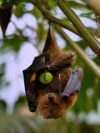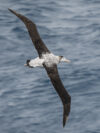Zambian Vulture Conservation Program
Tags: Research, Conservation Action, Zambia
Implementing Partner: BirdWatch Zambia, Endangered Wildlife Trust, Caring For Conservation Fund
Vulture Conservation in Zambia
Vultures fulfil an extremely important function in African ecosystems. Yet more than 69% of all vulture species are threatened, with a large proportion facing extinction. Many factors are responsible for the decline, but poisoning and traditional belief use are among the most serious, accounting for 90% of all reported deaths (1). Due to the very low reproduction rate – most vultures only lay one egg per year – every poisoning or killing of a vulture has a massive impact on the population.
Many areas, like the Luambe National Park in eastern Zambia, have had to deal with poisoned water holes or animal carcasses time and again in recent years. One of the main reasons for poisonings are poachers who want to prevent poached animals from being spotted by the authorities through vultures circling in the sky. In 2020, one of the most devastating poisoning incidents in the whole of Africa occurred in eastern Zambia, where more than 800 vultures of three critically endangered species (White-backed vulture (Gyps africanus), White-headed vulture (Trigonoceps occipitalis), Hooded vulture (Necrosyrtes monachus) and one endangered species (Lappet-faced vulture (Torgos tracheliotos)) died. This stresses the need of effective vulture conservation efforts in and around Zambia.
In cooperation with the South African conservation organisation “Endangered Wildlife Trust” and the Zambian bird protection organisation “BirdWatch Zambia” the Zambian Vulture Conservation Program has been initiated in 2021.
Your Contribution to Vulture Conservation
By using GPS- and GSM-tracking units, we can monitor the movements of vultures in real time. The units are specially tailored to the weight of the respective vulture species and can run continuously for several years. Inbuilt mortality- and accelerometer sensors allow the identification of unnatural movements which helps to monitor the fitness of the tagged birds. Ultimately, the movement analysis allows the identification of common feeding and breeding sites, which can later on be protected. The data also allows several scientific uses, such as the determination of common flyways of the different vulture populations in and around Zambia.
Vultures can cover great distances, crossing many country borders. Many of the tagged birds have been recorded in surrounding Malawi, Congo, Angola, Namibia, Zimbabwe, Mozambique and even South Africa. It is therefore important to collaborate and share data on an international scale.
So far, 47 individuals of three critically endangered species (White-backed Vulture, Hooded Vulture and White-headed Vulture) and one endangered species (Lappet-faced Vulture) have been tagged with tracking units. In 2022, the project has extended its impact and focussed on other areas in Zambia such as Liuwa Plain National Park in eastern Zambia, Kasanka National Park and Bangweulu Wetlands in the Central / Muchinga province of Zambia and Luambe National Park in eastern Zambia. In 2023, we increased the sample in Liuwa Plain National Park. Furthermore, we fitted additional tracking devices on vultures in Chisamba, North Luangwa and Nsumbu National Park.
Ogada, Darcy, et al. “Another continental vulture crisis: Africa’s vultures collapsing toward extinction.” Conservation Letters 9.2 (2016): 89-97.




